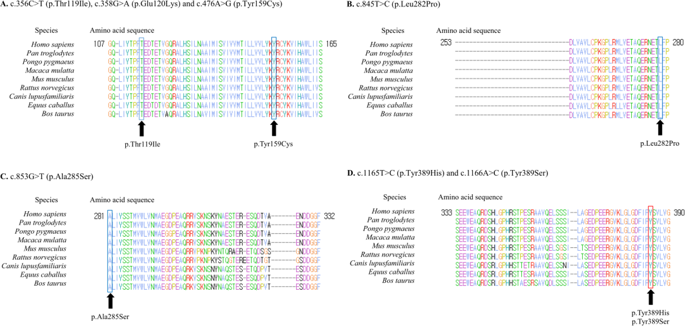Our official English website, www.x-mol.net, welcomes your
feedback! (Note: you will need to create a separate account there.)
PSEN1 variants in Korean patients with clinically suspicious early-onset familial Alzheimer's disease.
Scientific Reports ( IF 3.8 ) Pub Date : 2020-02-26 , DOI: 10.1038/s41598-020-59829-z Young-Eun Kim 1 , Hanna Cho 2 , Hee Jin Kim 3 , Duk L Na 4 , Sang Won Seo 4 , Chang-Seok Ki 5
Scientific Reports ( IF 3.8 ) Pub Date : 2020-02-26 , DOI: 10.1038/s41598-020-59829-z Young-Eun Kim 1 , Hanna Cho 2 , Hee Jin Kim 3 , Duk L Na 4 , Sang Won Seo 4 , Chang-Seok Ki 5
Affiliation

|
Pathogenic variants in the PSEN1 gene are known to be the most common cause of early-onset Alzheimer's disease but there are few data on the frequency and spectrum of PSEN1 variants in Korea. In this study, we investigated PSEN1 variants in a consecutive series of clinically suspicious early-onset familial AD (EOFAD) Korean patients and their clinical characteristics and imaging findings. From January 2007 to December 2013, EOFAD patients with very early onset AD (<50 yr), early onset AD (<60 yr) with two or more relatives with AD, and early onset AD (<60 yr) with one or more first-degree relatives with very early onset AD (<50 yr) were enrolled in this study. Sequence analysis of the PSEN1 gene was performed by Sanger sequencing. Neuroimaging data and conventional brain MRIs and FDG-PET and/or [11C] PiB-PET scans were analyzed in patients with PSEN1 variants. Among the 28 patients with EOFAD, six (21.4%, 6/28) patients had pathogenic or likely pathogenic variants in the PSEN1 gene. Two pathogenic variants were p.Glu120Lys and p.Ser170Phe and four likely pathogenic variants were p.Thr119Ile, p.Tyr159Cys, p.Leu282Pro, and p.Ala285Ser. Two patients had variants of unknown significance, p.Tyr389His and p.Tyr389Ser. EOFAD patients with PSEN1 variants showed early AD onset, frequent visuospatial dysfunction, movement disorders, and rapid disease progression. Brain MRIs revealed diffuse cortical atrophy, including parietal lobe atrophy, and/or hippocampal atrophy. FDG-PET scans also revealed significant hypometabolism in the bilateral temporo-parietal regions. Our findings provide insight to better understand the genetic background of Korean EOFAD patients.
中文翻译:

临床可疑的早发性家族性阿尔茨海默氏病的韩国患者中的PSEN1变异体。
已知PSEN1基因的致病变异是引起早老性阿尔茨海默氏病的最常见原因,但在韩国,有关PSEN1变异的频率和频谱的数据很少。在这项研究中,我们调查了一系列临床可疑的早发性家族性AD(EOFAD)韩国患者的PSEN1变异体及其临床特征和影像学发现。从2007年1月至2013年12月,EOFAD患者的AD发病很早(<50岁),AD发病较早(<60岁)有两个或多个亲戚,AD发病较早(<60岁)有一个或多个患有AD发病很早(<50岁)的度数亲戚参加了这项研究。通过Sanger测序对PSEN1基因进行序列分析。在具有PSEN1变异的患者中分析了神经影像数据和常规脑MRI以及FDG-PET和/或[11C] PiB-PET扫描。在28名EOFAD患者中,有6名(21.4%,6/28)患者在PSEN1基因中具有致病性或可能的致病性变异。两种致病变异是p.Glu120Lys和p.Ser170Phe,四种可能的致病变异是p.Thr119Ile,p.Tyr159Cys,p.Leu282Pro和p.Ala285Ser。两名患者的p.Tyr389His和p.Tyr389Ser具有未知的变异。具有PSEN1变体的EOFAD患者表现出AD发病初期,频繁的视觉空间功能障碍,运动障碍和疾病的快速进展。脑MRI显示弥漫性皮质萎缩,包括顶叶萎缩和/或海马萎缩。FDG-PET扫描还显示双侧颞顶区明显的低代谢。
更新日期:2020-02-26
中文翻译:

临床可疑的早发性家族性阿尔茨海默氏病的韩国患者中的PSEN1变异体。
已知PSEN1基因的致病变异是引起早老性阿尔茨海默氏病的最常见原因,但在韩国,有关PSEN1变异的频率和频谱的数据很少。在这项研究中,我们调查了一系列临床可疑的早发性家族性AD(EOFAD)韩国患者的PSEN1变异体及其临床特征和影像学发现。从2007年1月至2013年12月,EOFAD患者的AD发病很早(<50岁),AD发病较早(<60岁)有两个或多个亲戚,AD发病较早(<60岁)有一个或多个患有AD发病很早(<50岁)的度数亲戚参加了这项研究。通过Sanger测序对PSEN1基因进行序列分析。在具有PSEN1变异的患者中分析了神经影像数据和常规脑MRI以及FDG-PET和/或[11C] PiB-PET扫描。在28名EOFAD患者中,有6名(21.4%,6/28)患者在PSEN1基因中具有致病性或可能的致病性变异。两种致病变异是p.Glu120Lys和p.Ser170Phe,四种可能的致病变异是p.Thr119Ile,p.Tyr159Cys,p.Leu282Pro和p.Ala285Ser。两名患者的p.Tyr389His和p.Tyr389Ser具有未知的变异。具有PSEN1变体的EOFAD患者表现出AD发病初期,频繁的视觉空间功能障碍,运动障碍和疾病的快速进展。脑MRI显示弥漫性皮质萎缩,包括顶叶萎缩和/或海马萎缩。FDG-PET扫描还显示双侧颞顶区明显的低代谢。













































 京公网安备 11010802027423号
京公网安备 11010802027423号